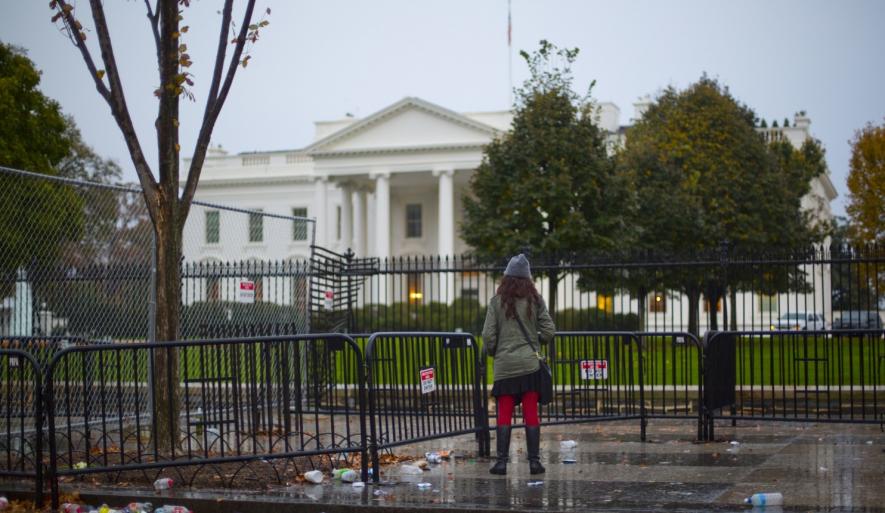Politics is the Solution

Photo by Pablo Martinez Monsivais
We have no illusions about the impact of Donald Trump’s victory. It is a disaster. The prospect of a unified right-wing government, led by an authoritarian populist, represents a catastrophe for working people.
There are two ways to respond to this situation. One is to blame the people of the United States. The other is to blame the elite of the country.
In the coming days and weeks, many pundits will be doing the former. Frightened liberals have already written explainers on how to move to Canada; last night, the Canadian immigration website went down after a surge of traffic. The people who brought us to this precipice are now planning their escape.
But blaming the American public for Trump’s victory only deepens the elitism that rallied his voters in the first place. It’s unquestionable that racism and sexism played a crucial role in Trump’s rise. And it’s horrifying to contemplate the ways that his triumph will serve to strengthen the cruelest and most bigoted forces in American society.
Still, a response to Trump that begins and ends with horror is not a political response — it is a form of paralysis, a politics of hiding under the bed. And a response to American bigotry that begins and ends with moral denunciation is not a politics at all — it is the opposite of politics. It is surrender.
To believe that Trump’s appeal was entirely based on ethnic nationalism is to believe that a near majority of Americans are driven only by hate and a shared desire for a white supremacist political program.
We don’t believe that. And the facts don’t bear it out.
This election, in the words of New York Times analyst Nate Cohn, was decided by people who voted for Barack Obama in 2012. Not all of them can be bigots.
Clinton won only 65 percent of Latino voters, compared to Obama’s 71 percent four years ago. She performed this poorly against a candidate who ran on a program of building a wall along America’s southern border, a candidate who kicked off his campaign by calling Mexicans rapists.
Clinton won 34 percent of white women without college degrees. And she won just 54 percent of women overall, compared to Obama’s 55 percent in 2012. Clinton, of course, was running against a candidate who has gloated on film about grabbing women “by the pussy.”
This was Clinton’s election to lose. And she lost. A lot of the blame will fall on Clinton the candidate, but she only embodied the consensus of this generation of Democratic Party leaders. Under President Obama, Democrats have lost almost a thousand state-legislature seats, a dozen gubernatorial races, sixty-nine House seats and thirteen in the Senate. Last night didn’t come out of nowhere.
The problem with Clinton wasn’t her peculiarity but her typicality. It was characteristic of this Democratic Party that the power players in Washington decided on the nominee — with overwhelming endorsements — many months before a single ballot was cast.
They made a fateful choice for all of us by stacking the deck, decisively, against the kind of politics that could win: a working-class politics.
Seventy-two percent of Americans who voted last night believed that “the economy is rigged to the advantage of the rich and powerful.” Sixty-eight percent agreed that “traditional parties and politicians don’t care about people like me.”
Almost alone among Democratic politicians, Bernie Sanders spoke to this simmering sense of alienation and class anger. Sanders had a basic message for the American people: you deserve more and you are right to believe you do. Health care, college education, a living wage. It’s a message that has made him by far the most popular politician in the country.
Hillary Clinton’s formal platform approached some of Sanders’s concrete ideas, but repudiated its core message. For those in charge of the Democratic Party, it made no sense to rail against America. For them, America never stopped being great. And things have only been getting better.
Party leaders asked voters to hand politics over to them. They thought they had it under control. They were wrong. Now we all have to deal with the consequences. And we will.
This is a new era that requires a new type of politics — one that speaks to people’s pressing needs and hopes, rather than to their fears. Elite liberalism, it turns out, cannot defeat right-wing populism. We can’t move to Canada or hide under the bed. This is a moment to embrace democratic politics, not repudiate them.
Get the latest reports & analysis with people's perspective on Protests, movements & deep analytical videos, discussions of the current affairs in your Telegram app. Subscribe to NewsClick's Telegram channel & get Real-Time updates on stories, as they get published on our website.
























